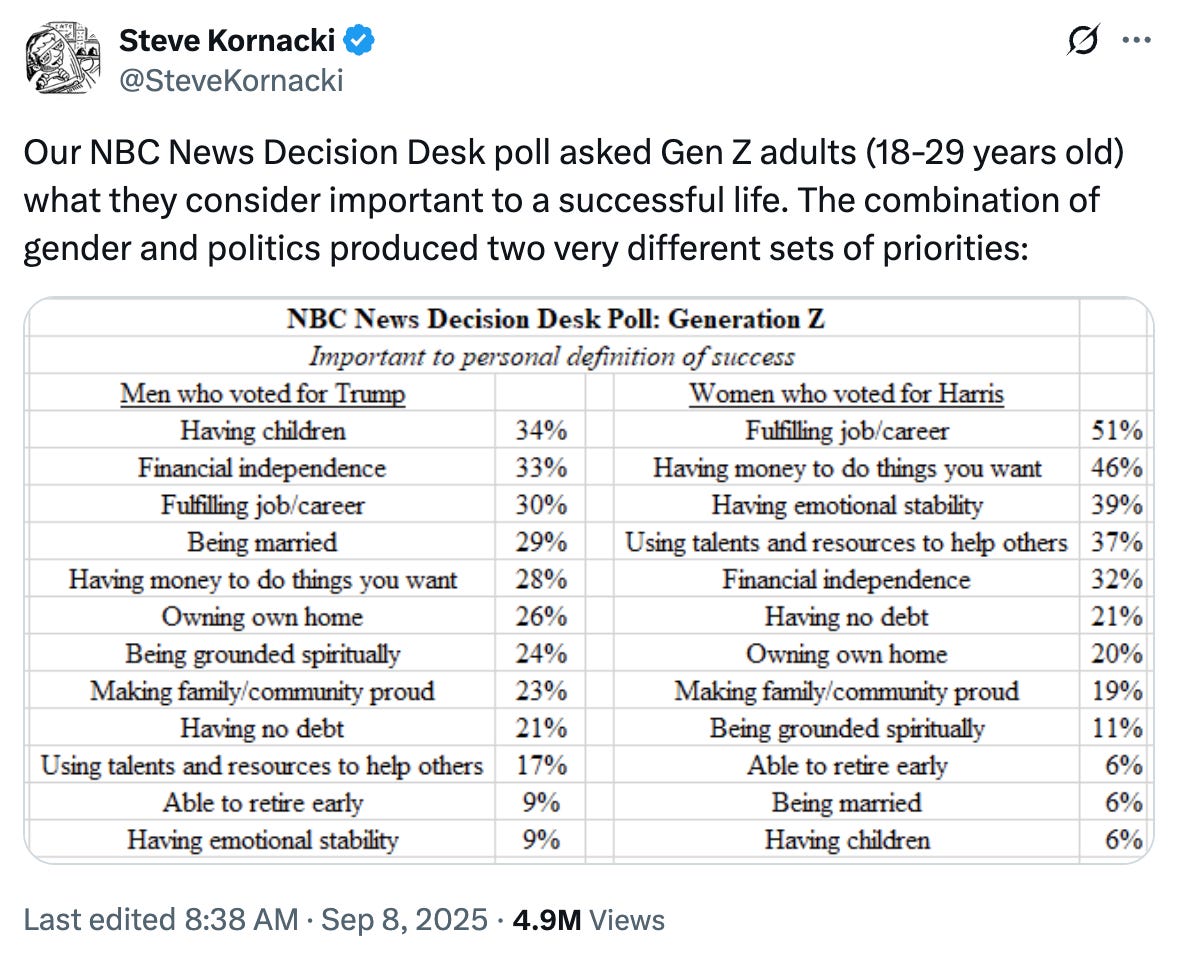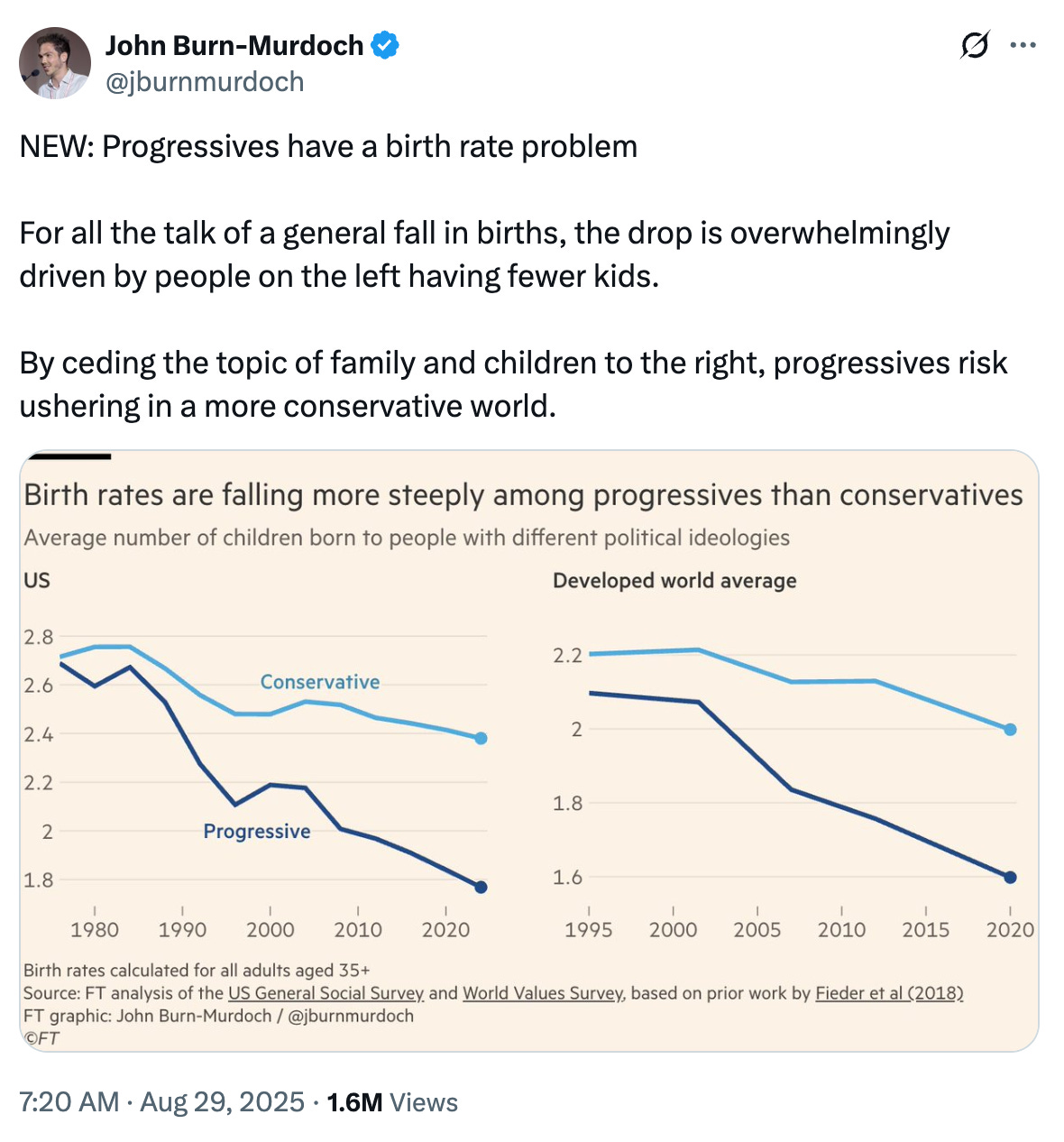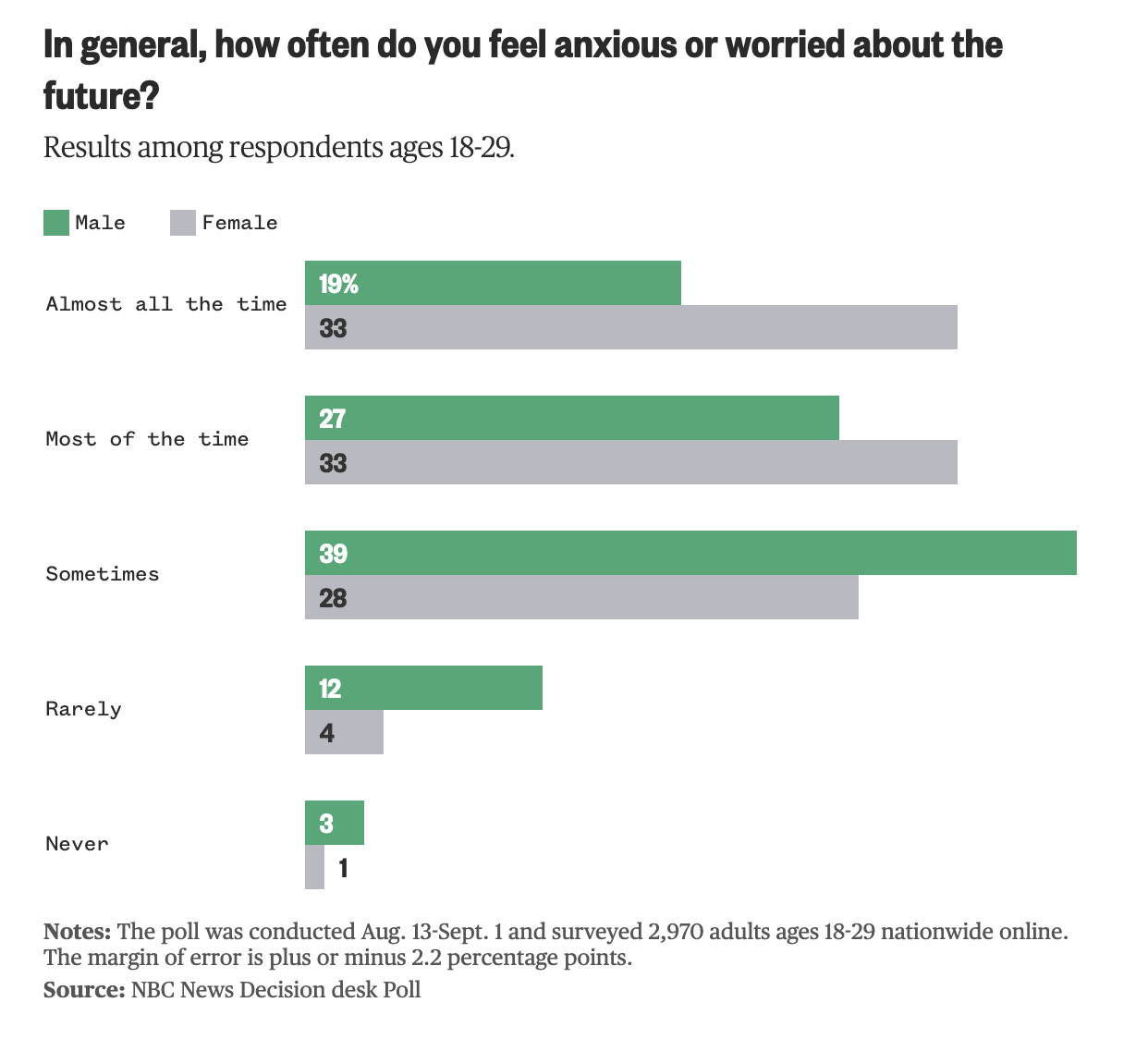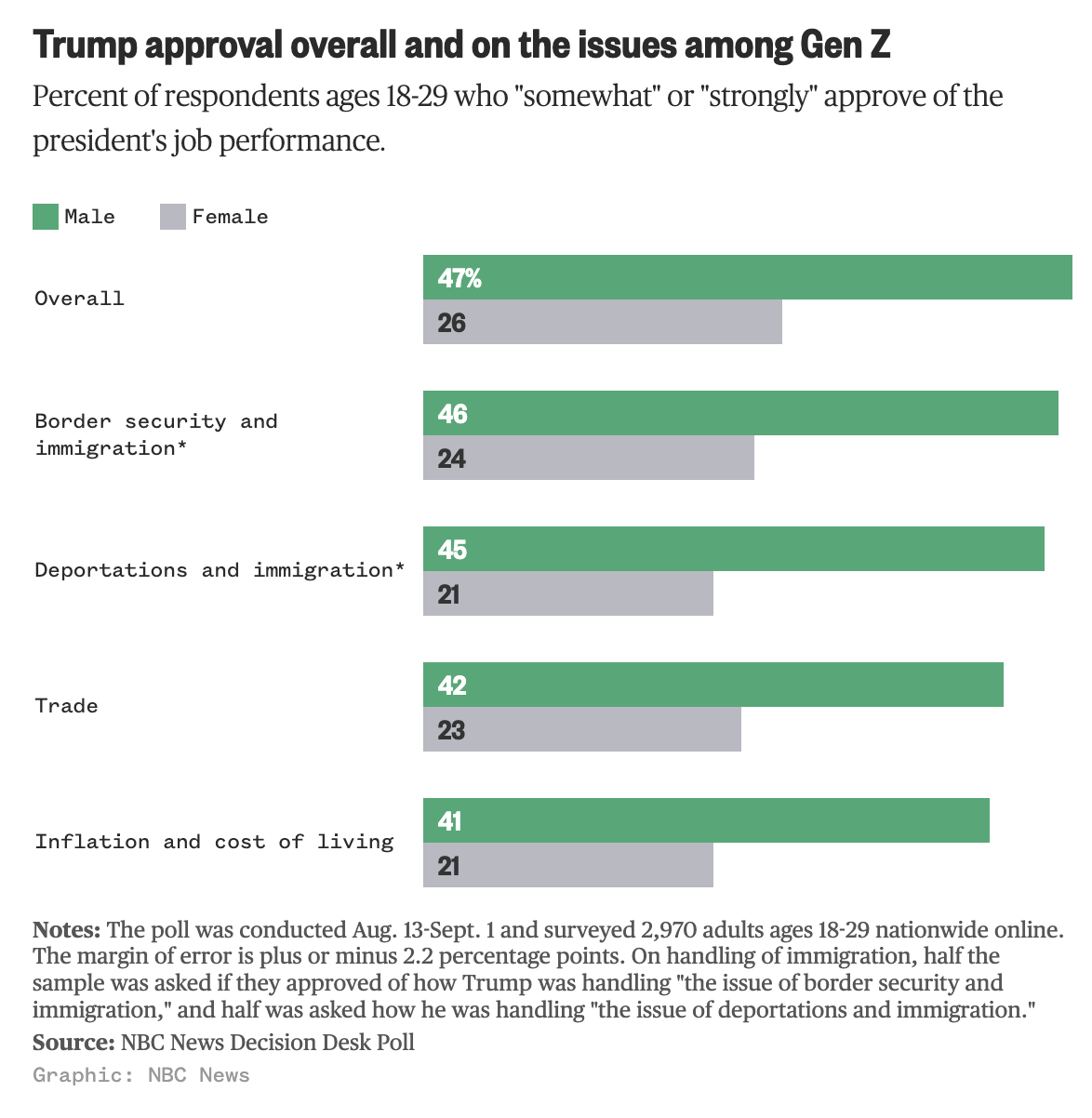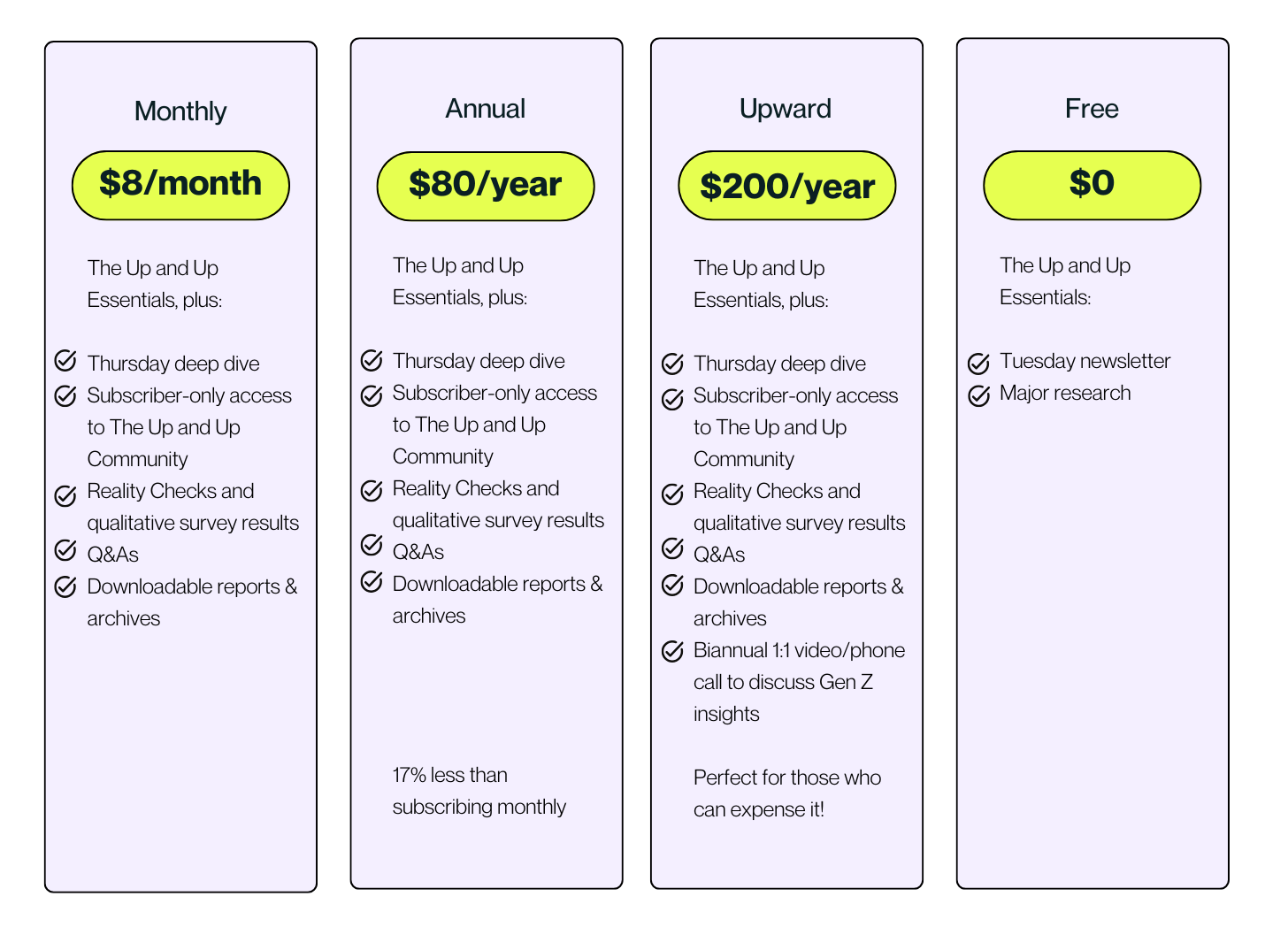Trad Husbands > Trad Wives
Gen Z Men Want Kids and Marriage. Women Want Independence. They’re Talking Past Each Other.
There’s new data showing Gen Z men and women are increasingly split in how they see success – especially when it comes to social benchmarks like marriage, having kids, and making their families proud.
According to the latest NBC News’ Decision Desk Poll poll, young men are more likely than young women to see being married, having children, and making their family or community proud as key to their personal definition of success.
Young women, on the other hand, report higher levels of anxiety about the future, and are more likely to prioritize being spiritually grounded.
This is bigger than a polling gap. For many Gen Z men, success still leans on traditional milestones like marriage and family. Whereas for many Gen Z women, success is defined less by roles (wife, mother) and more by fulfillment and independence. That’s both a cultural preference and a recalibration of what stability and empowerment look like.
This misalignment matters. When men and women are working from different definitions of success, it makes coupling up harder, which only compounds concerns about marriage and birth rates. The gap is actually deeply practical.
Let’s break it down:
Asked to pick three values in the NBC poll (out of a total 13) important to their “personal definition of success”:
Young men ranked “making your family or community proud” #5, “being married” #7, and “having children” #8. Young women put all three lower: #9, #11, and #10, respectively.
Instead, young women ranked “being spiritually grounded” #8, compared to #11 for young men. They also put “having emotional stability” #4, while young men ranked it #10.
The youth partisan gender gap is well documented. But these differences in life priorities become even more pronounced when you break them down by politics, looking at Gen Z Trump voters vs. Harris voters.
Young men who voted for Trump ranked having children #1 and getting married #4.Young women who voted for Harris ranked having children #12 and marriage #11.
Even when you flip the partisan lens, the divide remains. Harris-voting men put marriage at #9 and children at #10, which is still higher than Harris-voting women. Trump-voting women ranked children #6 and marriage #9, which is still lower than Trump-voting men. (It’s worth noting that these trends are already manifesting in results, according to data that the Financial Times’ John Burn-Murdoch published at the end of the summer – showing that birth rates are falling faster among progressives than conservatives.)
As for anxiety, the gap between Gen Z men and women is unmistakable: two-thirds (66%) of young women in the NBC poll say they feel worried about the future most or almost all the time, compared to less than half 46% of young men – a 20-point difference.
Neither group gives Trump a majority approval. But young men are 21 points more likely than young women to approve of his job performance (47% to 26%).
So what? The NBC poll reflects a bigger story: Gen Z men and women are growing up on different tracks. Women are outpacing men in high school and college completion rates. Algorithms are sorting them into different corners of the internet, where creators are living in alternate realities and having separate conversations about life values. Think about what’s most visible to young women (fashion, beauty, entrepreneurship), and what’s most visible to young men (sports, business, health and wellness). They’re not just being fed different information, they’re absorbing different narratives of success.
At The Up and Up, we’ve watched as these gaps widen in listening sessions and 1:1 conversations. This summer, our intern Brooke wrote about the divide from her perspective as a twin. When she asked her peers about their futures, many boys mentioned finding a loving wife. The girls she spoke with were less specific, focusing instead on building a happy, healthy life.
Last spring, The Up and Up saw this data come to life firsthand when we wrote about high schoolers in Arkansas who talked about the way anxiety manifests differently for girls and boys.
I was also reminded of an oped I wrote for The Washington Post in May about why some young people are wary of having kids, pointing to economic insecurity, and the gender gap itself, which makes it hard for Gen Z men and women to pair off up, let alone start families. If their priorities are so misaligned, how could they possibly conceive of conception?
Reconciling the differences, focusing on financial independence
The Gen Z gender gap is real – and cause for concern. But across partisan divides, there are areas of agreement. Both Trump voting young men and Harris voting young women are nearly as likely to define success through financial independence (at 33% and 32% respectively). That shared baseline could be the starting point for bridging some of the divides.
Reconciling young men and women’s differences starts with recognizing financial independence as common ground. But the bigger opportunity — for politicians, for corporate leaders, brands, for anyone trying to reach Gen Z — is learning to speak to both independence and belonging at once. That’s the future Gen Z is craving.
A note about our paid-tier launch
Last week, we announced the launch of The Up and Up’s paid tier model: $8 a month, $80 yearly, and $200 for an ‘Upward’ membership, perfect for those who can expense their subscriptions.
We are incredibly grateful for those of you who have already upgraded your subscription (or who subscribed for the first time). Thanks to your support, The Up and Up hit #19 in rising politics publications on Substack this week, and we are so excited for all that’s to come.
As a reminder, our free tier remains and all subscribers will still get The Up and Up Essentials: our Tuesday newsletter and major research. Paying subscribers (at both the monthly and annual tier) will receive The Up and Up Essentials, plus a Thursday deep dive into Gen Z culture, politics, and power, and proprietary access to The Up and Up’s Gen Z community. Upward members will be able to access all of the above, and a 1:1 video or phone call, twice a year, to discuss custom Gen Z insights relevant to you and your work.
Here’s a chart breaking it all down.
If you haven’t yet, we hope you’ll consider upgrading! It’s worth it :)
Noteworthy reads
Is Partying Dead, or Are You Just Old?, Savannah Sobrevilla for The New York Times
Sports fans are embracing solo game days, Maxwell Millington for Axios
How the tiny tattoo became a big status symbol, Juliana Kaplan for Business Insider
What’s Really Going on With Sex Scenes? According to Our New Data, Not What You’ve Heard, Nicole Pasulka for Cosmopolitan


